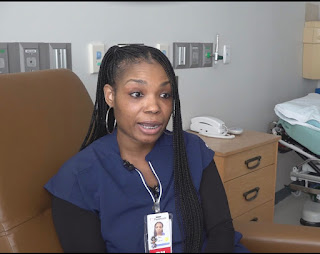
She hadn’t spoken to her family in weeks, and the man beside her kept answering questions meant for her as if she didn’t have a voice of her own. That was the first red flag for Tiara McCoy, a pre-op nurse at Piedmont Northside Hospital in Macon, Georgia, when a young patient arrived for what was supposed to be a routine surgical procedure. The paperwork was in order, the insurance had checked out, and nothing on paper hinted at trouble.
But people tell the truth with their bodies long before they do with their words, and this girl’s every movement seemed to scream for help.McCoy watched her shrink in on herself, shoulders tight, gaze fixed on the floor as if she hoped she could disappear. Her hands trembled each time she had to sign something. And whenever McCoy directed a simple medical question her way—Are you allergic to anything? Have you eaten today?
Do you understand the procedure?—the older man beside her answered first, his tone firm, rehearsed, almost possessive. He hovered too close, kept a hand on her arm, and controlled each interaction with an intensity that made McCoy’s stomach twist.It wasn’t just awkward. It felt dangerous.Hospitals are trained to spot signs of coercion or trafficking, and McCoy’s instincts were screaming loud enough to drown out the hospital noise around her.
She excused herself, walked out of the bay, and alerted the charge nurse, explaining everything she’d observed. Administrators were contacted, then hospital security, and soon after, local authorities. Within minutes, the simple pre-op check had become an emergency intervention.When officers arrived, their questions confirmed what McCoy had feared: the young woman had been reported missing. Her silence wasn’t consent. It was survival. And McCoy’s vigilance likely saved her life.




